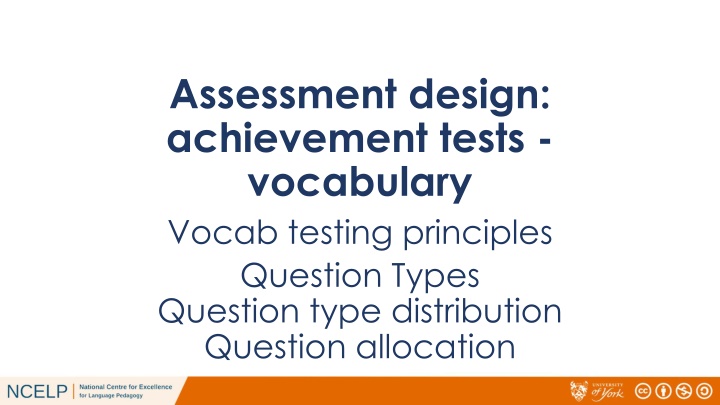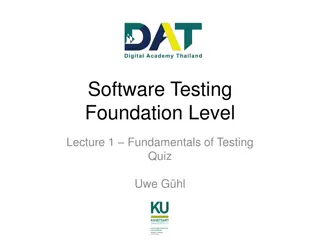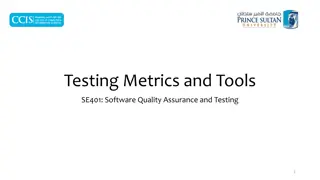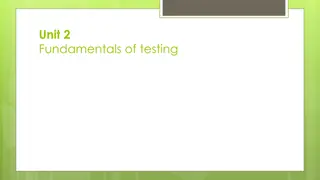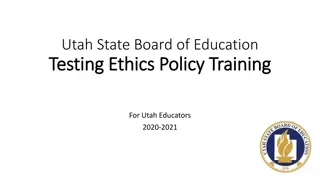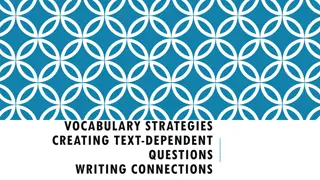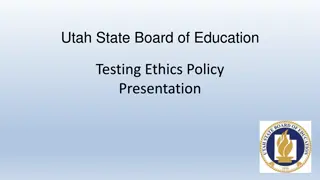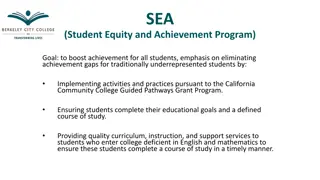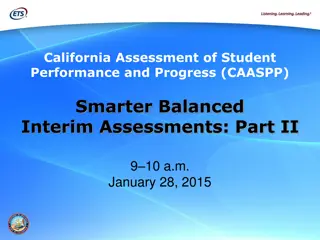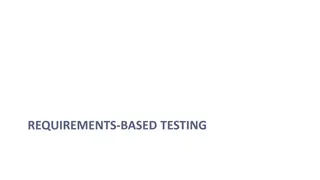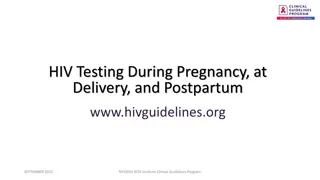Vocabulary Testing Principles and Strategies for Achievement Assessments
This comprehensive assessment design focuses on testing students' vocabulary knowledge, covering breadth and depth of vocabulary studied in Year 7. It includes considerations for syllabus-based achievement tests, productive versus receptive knowledge, oral and written modalities, and distribution of words from different languages. The objectives aim to determine the number of words students know and assess their understanding of target words beyond Year 8. Various testing methods like recognition and recall are employed to evaluate students' memory and comprehension skills.
Download Presentation

Please find below an Image/Link to download the presentation.
The content on the website is provided AS IS for your information and personal use only. It may not be sold, licensed, or shared on other websites without obtaining consent from the author.If you encounter any issues during the download, it is possible that the publisher has removed the file from their server.
You are allowed to download the files provided on this website for personal or commercial use, subject to the condition that they are used lawfully. All files are the property of their respective owners.
The content on the website is provided AS IS for your information and personal use only. It may not be sold, licensed, or shared on other websites without obtaining consent from the author.
E N D
Presentation Transcript
Assessment design: achievement tests - vocabulary Vocab testing principles Question Types Question type distribution Question allocation
Vocab testing principles Objectives To test breadth and depth of knowledge of vocabulary studied in Y7 Terms 1.1.1 - 2.1.1 Considerations Syllabus-basedachievement test Productive vs receptive knowledge Recall vs recognition Oral and written modalities
Breadth of knowledge Objective 1: To find out how many words students know Sample size Target time: 12 minutes Pilot testing indicates students can comfortably answer one question in 9 seconds 720 / 9 = 80 total test items (split equally between L, R, W & S) SOW coverage: French: 43%* Spanish:35% German: 35%
Breadth of knowledge Objective 1: To find out how many words students know Item pool To test overall knowledge of words in SOW words distributed amongst students Words are equally likely to be selected from randomised pools All words in the SOW appear in the test onceonly Part of speech ratios (noun : verb : other) broadly upheld within different question types (French: 2:1:2; Spanish: 3:1:3; German: 2:1:3)
Nation 2013, p. 538 Depth of knowledge Objective 2: To find out how well students know target words Year 8+ tested separately Year 8+
Depth of knowledge Recognition tests multiple choice activities whereby learners select or guess the correct response from the alternatives given such tests may strengthen any existing memory traces (McDaniel & Mason, 1985) Recall demands the production of responses from memory more difficult than recognition because learners must search for the correct response within their mental representation of the newly experienced information (Cariana & Lee, 2001; Glover, 1989; McDaniel & Mason, 1985). Definitions adapted from Jones (2004)
Read 2000, Chapter 3 Question type 1 Modality Listening Type of activity Spoken meaning recognition Knowledge tested Meaning (definition)
Read 2000, Chapter 3 Question type 2 Modality Listening Type of activity Spoken meaning recall Knowledge tested Meaning (definition) Meaning (association)
Read 2000, p. 163 Question type 3 Modality Reading Type of activity Written meaning recall Knowledge tested Meaning (definition)
Question type 4 Modality Reading Type of activity Written meaning recall Knowledge tested Meaning (definition) Use (collocation)
Question type 5 Modality Writing Type of activity Written form recall Knowledge tested Form (written) Meaning (definition)
Laufer & Nation 1995 Question type 6 Modality Writing Type of activity Written form recall Knowledge tested Form (written) Meaning (definition) Use (collocation)
Question type 7 Modality Speaking Type of activity Spoken form recall Knowledge tested Form (spoken) Meaning (definition)
Question type distribution Listening Reading Writing Speaking 10 x spoken meaning recognition 20 x written meaning recall 20 x written form recall 20 x spoken form recall 10 x spoken meaning recall 10 x recognition, 70 x recall Bias towards recall encourages active vocabulary building from the beginning and minimises use of multi-choice - a score of 16.7% can be achieved by guessing in a 6- choice format, and of 25% in 4-choice
Question allocation Factors influencing question type allocation: concreteness, polysemy (multiple meanings) Factors influencing distractor choice: word class (noun, verb, adj, ), spelling
